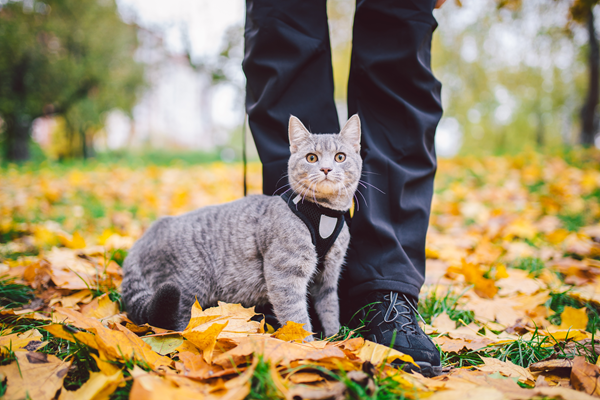
Walking your indoor cat on a leash can be a great way to enrich their life, offering new experiences and stimulation. Imagine taking your cat to the park; reading on a park bench while your cat sits beside you. You enrich your cat’s life by involving them in your daily routines. However, it’s important to weigh the benefits against the risks to ensure your feline friend stays happy and healthy. Here’s a detailed look at the advantages and disadvantages of taking your indoor cat outside on a leash.
Benefits of Taking Your Cat Outside on a Leash
- Physical exercise: Outdoor walks can help keep an indoor cat fit and healthy, preventing obesity and related health issues.
- Enrichment and mental stimulation: The new sights, sounds, and smells of the outdoors provide mental stimulation that can reduce boredom and promote overall well-being. Cats are naturally curious, and exploring new environments satisfies their innate desire to investigate and explore.
- Reduced stress and anxiety: A change of scenery and a break from the monotony of indoor life can lead to improvements in behavior. It may reduce negative behaviors like scratching furniture or excessive meowing.
- Bonding opportunities: Walking your cat on a leash provides a unique bonding experience, strengthening the relationship between you and your pet through quality time spent together.
Risks of Taking Your Cat Outside on a Leash
- Exposure to outdoor dangers: Outdoor environments can expose your cat to potential threats, including dogs, wild animals, and traffic.
- Parasites: Outdoor exposure increases the risk of encountering fleas, ticks, and other parasites.
- Infectious disease: Your cat may encounter other animals or environments that could expose them to infectious disease like feline leukemia virus or calicivirus.
- Overstimulation: The outdoor environment can be overwhelming for some cats, causing stress or anxiety due to unfamiliar sights and sounds.
- Fear: Loud noises, sudden movements, or encountering unfamiliar animals can frighten your cat, leading to a negative experience.
- Potential for escape: If a harness is fitted incorrectly or if your cat becomes scared, there is a risk they could slip out and run away.
- Supervision: It’s crucial to always supervise your cat while outside to prevent escape or injury.
Tips for Safe and Enjoyable Walks
- Proper preparation: Harness train your cat indoors, making sure they are comfortable with the harness and leash before venturing outside. Gradually introduce them to the outdoors with short, supervised sessions in a quiet, secure area.
- Health precautions: Use flea and tick preventatives as recommended by your veterinarian, and ensure your cat is up-to-date on vaccinations to protect against outdoor diseases.
- Safety and supervision: Choose safe, quiet areas for walks, away from busy streets and potential dangers. Always supervise your cat closely and be prepared to intervene if they become stressed or encounter a threat.
- Positive reinforcement: Use treats and positive reinforcement to create a positive association with outdoor walks, ensuring your cat always feels safe and comfortable. If they show signs of distress, return indoors and try again another day.
Walking your indoor cat on a leash can be a rewarding experience that offers numerous benefits, from physical exercise to mental stimulation and bonding. However, it’s essential to consider and mitigate the potential risks to ensure your cat’s safety and well-being. With proper preparation, patience, and precautions, you can safely introduce your cat to the wonders of the outdoors and enrich their life in the process.
